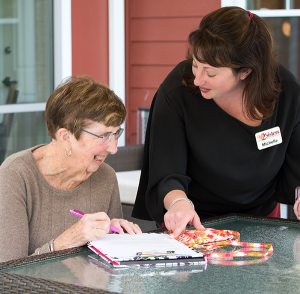
I speak with the families of older adults every day. Nearly all of them are anxious about choosing the “best” assisted living for their loved ones. I understand. Having moved my own parents, I know that there is no way to fully prepare for a transition like this.
For many families, the hardest part of the process comes near the end, as they are choosing between two or three “finalists.” At this point, they have already narrowed the options based on what I think of as fundamental features — things like location, levels of care, price, apartment size, etc.
Those are important in narrowing the field, of course. But when it comes to making your final decision about a community, the people are what matter most. Pretty chandeliers, large windows, and an impressive, restaurant-style dining room are nice. But the value of those fades quickly, especially if the service is not measuring up to your expectations.
What’s going to matter most for your parents’ health, satisfaction and longevity are the people who care for them every day.
The Executive Director
As you gather information and tour facilities, you will have many interactions with the Marketing Director. This person will listen to your concerns and highlight the aspects of their community that address those items: It’s a beautiful continuing care campus, the food is wonderful, we are pet-friendly, etc.
That’s fine. Just remember that once moved in, the Marketing Director will usually have little to no involvement in your loved one’s day-to-day experience and care. To assess that, you’ll want to meet and interview the Executive Director.
The Executive Director runs the show. He or she manages every detail of the organization — overseeing hiring and setting the overall tone and culture — all the way down to the way linens are changed and the bathrooms are cleaned.
So, I recommend setting up a virtual or in-person meeting with this person. Then ask specific questions. For example, since my dad has Parkinson’s Disease, the timing of his medications is really important. I might ask something like, “Can you tell me about a resident you have had living here whose medication regimen was very time-specific and how you made sure they received their medications on schedule?”
The Executive Director is also the person in charge of resolving conflicts.Do you have confidence that this person will work with you to solve issues if and when they arise (okay, it’s always a matter of when)? Will they listen to you? Will they look for a compromise that works for everyone? Do you click with them on a personal level?
Knowing you have a partner who will work with you to address concerns as they arise is more important than trying to anticipate every possible hiccup beforehand.
The Staff
One thing Alyson and I always say is “happy staff equals happy residents.”As you tour a community, as much as possible, watch how staff interact with both you and those they are caring for. Do they make eye contact and say hello to you? Do they seem genuine and caring as they interact with residents, or are they just trying to get a job done?
Of course, anyone can have a bad day now and again. But on the whole, the staff should seem glad to be there. If people are rushed and stressed, that may be an indication of staffing issues or poor management.
If you can’t get a sense of the staff due to COVID, ask if you can speak with a couple of the caregivers or request a list of families that might be willing to talk with you about their own experiences.
I also recommend identifying and speaking with as many management team members as possible: the Directors of Wellness, Resident Care, Dining Services, Maintenance, Activities and others. These people are the day-to-day problem-solvers and trend-setters. If they are committed, helpful and happy, they will ensure that things run smoothly (and remove any staff that doesn’t live up to their standards).
Final Thoughts
When it comes to moving our loved ones to a new home, it’s natural to experience a mix of anxiety and second-guessing. That’s normal — it shows that you are trying your best to make a good decision.
Once you’ve done your homework and narrowed your choices based on the fundamentals, a deeper exploration with the people involved in the day-to-day care and customer service is your best bet in making a choice that will make everyone comfortable.